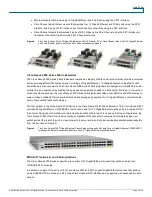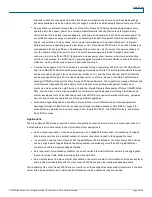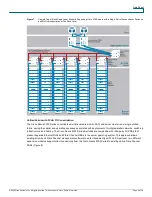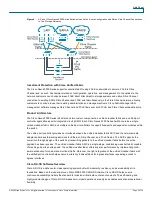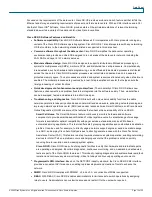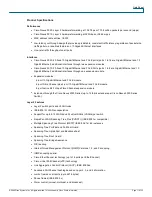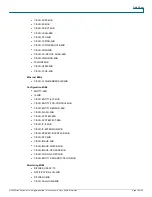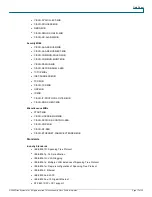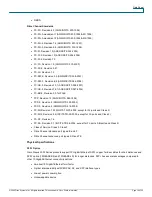
Data Sheet
© 2009 Cisco Systems, Inc. All rights reserved. This document is Cisco Public Information.
Page 4 of 22
Table 1 lists the supported transceiver options.
Table 1.
Cisco Nexus 5000 Series Transceiver Support Matrix
Cisco SFP
Description
Cisco SFP-10G-SR
10GBASE-SR SFP+ module (MMF)
Cisco SFP-10G-LR
10GBASE-LR SFP+ module (SMF)
Cisco SFP-H10GB-CU1M
10GBASE-CU SFP+ cable 1m (Twinax cable)
Cisco SFP-H10GB-CU3M
10GBASE-CU SFP+ cable 3m (Twinax cable)
Cisco SFP-H10GB-CU5M
10GBASE-CU SFP+ cable 5m (Twinax cable)
Cisco GLC-T
1000BASE-T SFP
Cisco GLC-SX-MM
GE SFP, LC connector SX transceiver (MMF)
Cisco GLC-LH-SM
GE SFP, LC connector LX/LH transceiver (SMF)
Cisco SFP-GE-T
1000BASE-T SFP, extended temperature range
Cisco SFP-GE-S
GE SFP, LC connector SX transceiver (MMF), extended temperature range and digital optical monitoring (DOM)
Cisco-SFP-GE-L
GE SFP, LC connector LX/LH transceiver (SMF), extended temperature range and DOM
Cisco DS-SFP-FC4G-SW
4-Gbps Fibre Channel SW SFP, LC (for Fibre Channel expansion module ports)
Cisco DS-SFP-FC4G-LW
4-Gbps Fibre Channel LW SFP, LC (for Fibre Channel expansion module ports)
The high bandwidth of 10 Gigabit Ethernet poses challenges to transmissions that are met by the transceiver and
cabling options supported by the Cisco Nexus 5000 Series.
The product family supports an innovative Twinax copper cabling solution that connects to standard SFP+
connectors for in-rack use, and optical cabling for longer cable runs (Table 2).
●
For in-rack or adjacent-rack cabling, the Cisco Nexus 5000 Series supports SFP+ direct-attach 10 Gigabit
Ethernet copper, an innovative solution that integrates transceivers with Twinax cables into an energy-
efficient, low-cost, and low-latency solution. SFP+ direct-attach 10 Gigabit Twinax copper cables use only 0.1
watt (W) of power per transceiver and introduce only approximately 0.25 microsecond of latency per link.
●
For longer cable runs, the Cisco Nexus 5000 Series supports multimode, short-reach optical SFP+
transceivers. These optical transceivers use approximately 1W per transceiver and have a latency of less
than 0.1 microsecond.
Both these options provide lower latency and higher energy efficiency than 10GBASE-T. This standard uses
transceivers that consume 4 to 8W per transceiver and contribute a latency of up to 2.5 microseconds per link,
making the 10GBASE-T standard a significant contributor to network-level power consumption.
Table 2.
The Cisco Nexus 5000 Series Supports SFP+ Direct-Attach 10 Gigabit Copper for In-Rack Cabling, and Optical
Solutions for Longer Connections
Connector (Media)
Cable
Distance
Power (Each Side)
Transceiver Latency (Link)
Standard
SFP+ CU copper
Twinax
5m
~0.1W
~0.1 microseconds
SFF 8431
SFP+ USR MMF and USR
(provided as comparison
point)
MM OM3
100m
1W
~0 microseconds
IEEE 802.3ae
SFP+ SR MMF and SR
MM OM2
MM OM3
82m
300m
1W
~0 microseconds
IEEE 802.3ae
RJ45 10GBASE-T copper (not
supported; provided as
comparison point)
Cat6a or 7
30m
100m
~4W
~6W
~1.5 microseconds
~2.5 microseconds
IEEE 802.3an



